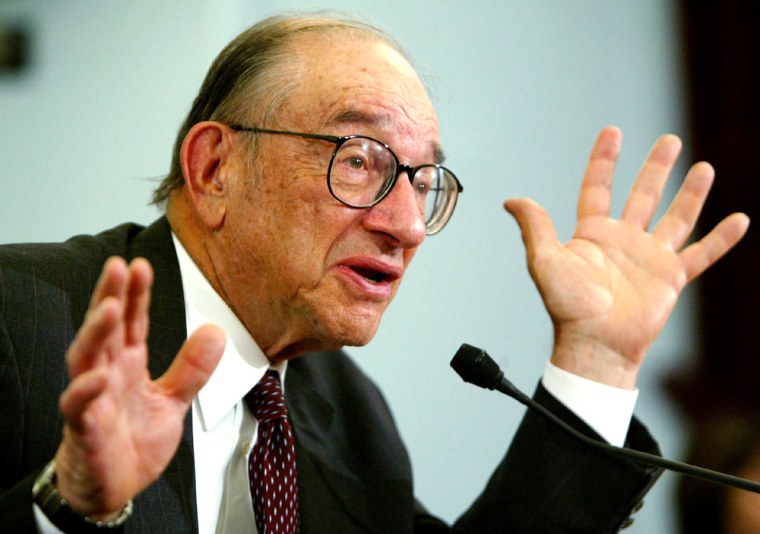Federal Reserve Chairman Alan Greenspan delivered an upbeat assessment of the economy Wednesday, saying the expansion has “regained some traction” after a recent slowdown brought on by rising oil prices. Greenspan’s testimony to the House Budget Committee was roughly in line with expectations and virtually guaranteed that central bankers will raise rates again this month at their last scheduled meeting before the November election.
“The most recent data suggest that, on the whole, the expansion has regained some traction,” Greenspan said in his statement to the committee. He noted that consumer spending and housing starts rebounded in July after a weak June, and he said business investment “remains on a solid upward trend.” While job growth has been weak this year compared with past expansions, Greenspan pointed out that the August results released last week represented an improvement over results from June and July.
“If it weren’t for the oil prices I would be very optimistic about where the economy is going,” he said in response to a question from the committee.
The economy has been one of the most hotly contested issues of this election year, and Greenspan’s comments offered some comfort for each of the two main contenders in the race.
Despite the recent soft patch, Greenspan said the “underlying structure of the recovery” remains sound, and he struck a tone of cautious optimism about the near term. His comments were generally positive, although they fell a bit short of President Bush’s oft-repeated mantra that the economy is “strong and getting stronger.”
On the other hand Greenspan spent much of his testimony warning of the long-term danger of rising budget deficits, although he was careful not to point fingers. Democratic challenger John Kerry has made fiscal responsibility a main theme of his economic platform and has denounced what he calls the “reckless” fiscal policies of the Bush administration.
Stock prices ended slightly lower and bond prices rose, sending market interest rates down as some analysts said Greenspan’s comments were not quite as bullish as expected.
“At the margin there is a subtle shift in tone from Greenspan,” said David Rosenberg, chief North American economist for Merrill Lynch. “Although he remains fairly optimistic he wasn’t exactly pounding his fist on the table.”
Still, the Fed is almost certain to raise short-term interest rates for a third time this year when policy-makers meet Sept. 21. With interest rates at historically low levels, the Fed is acting to gradually tighten credit and prevent rising inflation from gaining a strong foothold.
Tony Crescenzi, chief bond market strategist for Miller Tabak & Co., said a quarter-point rate hike this month is “baked in the cake.” He and other market analysts expect another quarter-point boost at the Fed’s next rate-setting meeting Nov. 10. That would bring the benchmark federal funds rate to 2 percent, which would be its highest rate since the recession ended in November 2001.
Analysts are uncertain whether the Fed will act again at the final meeting of the year in December, saying much depends on the course of employment and economic growth over the rest of the year.
Greenspan’s comments appeared slightly more upbeat than the assessment of regional central bankers in the Fed’s Beige Book report, which was released after his testimony. The report, reflecting informal interviews completed by late August, noted a softening in retail sales and some cooling in housing activity. The report will be used by Fed policy-makers to assess conditions and decide on interest rates at their upcoming meeting.
A gloomier view was made public Wednesday when the respected UCLA Anderson Forecast predicted consumer spending will remain weak for the foreseeable future and could trigger a recession within two years.
“I think consumers are maxed out right now," said senior economist Michael Bazdarich. He said there was a “small chance of recession over the next two years” if weary consumers pull back on new spending and shock the economy.
Other economists found that unlikely. Sung Won Sohn, chief economist at Wells Fargo, said it would take large external shocks to trigger a recession, such as a surge in oil prices coupled by tighter monetary policies, “which we do not see.”
In fact oil prices have fallen 13 percent from last month’s record of nearly $50 a barrel.
Greenspan said the oil price outlook remained uncertain, although he noted that inflation and inflation expectations have eased despite the run-up in crude. But he noted that future balances between oil supply and demand “will remain precarious,” forcing both advanced and developing countries to find ways to increase energy efficiency.
On the budget deficit, Greenspan said long-term prospects “remain troubling."
“With the baby boomers starting to retire in a few years and health spending continuing to soar, our budget position will almost surely deteriorate substantially in coming years if current policies remain in place,” Greenspan said.
He reiterated his call for measures such as triggers or a pay-as-you-go policy that forces Congress to match outlays and revenues more closely. And he said fundamental changes might be necessary to fix Social Security and Medicare.
Because members of the baby boom generation have not yet started to retire, he said, we are in a “demographic lull."
“But short of an outsized acceleration of structural productivity or a major expansion of immigration, this state of relative tranquility will soon end," he said.
He warned that “we may have already made promises to coming generations of retirees that we will be unable to fulfill.”
Greenspan issued a similar warning in his previous major speech last month, and some analysts say the issue is likely to be a recurring theme as the 78-year-old Fed chief approaches retirement in early 2006.
“I’m glad Greenspan is continuing to emphasize the need to reduce budget deficits, and I commend him for that,” Sohn said. “Nobody else in Washington is doing it. … It’s not a popular cry.”
Reuters contributed to this report.
